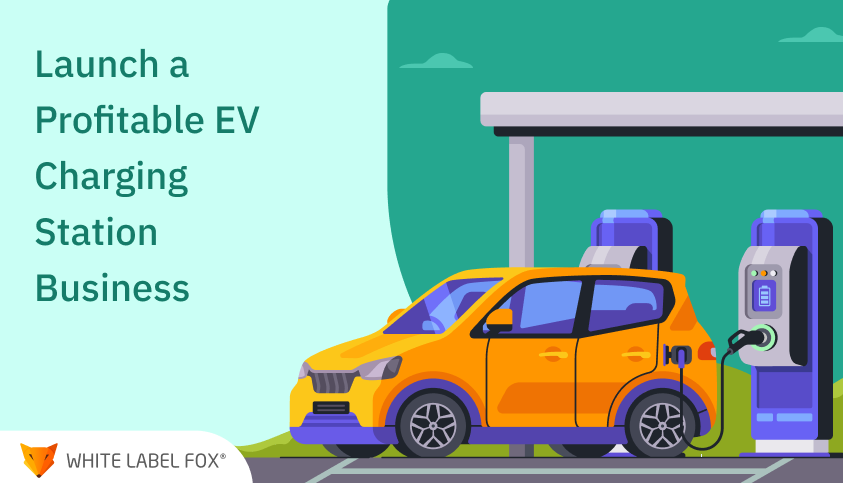With the growing use of electric vehicles, the demand for EV charging stations has also increased. As a result, many entrepreneurs are considering investing in the EV charging station business. If you are also thinking of the same, this blog post is only for you.
Read the blog to dive deep into how to launch a profitable EV charging station business, how profitable it is to start your EV charging station venture, and what it is.
Do You Want To Launch EV Charging Station App For Your Business ?
Connect With Our Experts And Discuss Your Ideas.

What is an EV Charging Station Business?
An Electric Vehicle (EV) Charging Station Business involves setting up and operating facilities where electric vehicles can be charged. As the adoption of electric vehicles (EVs) rises, the demand for accessible charging infrastructure also grows.
Moreover, EV charging stations are essential in supporting the widespread use of electric vehicles by providing a network of locations where EV owners can recharge their vehicles.
Different EV Charging Station Business Types
Electric vehicles and electric scooter sharing have gained popularity as eco-friendly alternatives to traditional internal combustion engines. A robust charging infrastructure is vital to support the growing demand for EVs. Various charging stations cater to different needs and charging speeds, ensuring flexibility for EV users.
Level 1 Charging
These charging stations are the most basic and typically use a standard household electrical outlet. They provide low-power charging, suitable for overnight charging at home or locations where faster charging options are unavailable. Charging speed is around 2 to 5 miles per hour.
Level 2 Charging
This type of charging station primarily uses the 240-volt electrical system, providing faster charging than Level 1. They are commonly found in residential settings, public charging, and workplace stations. Charging speed is about 10 to 30 miles of range per hour.
DC Fast Charging (Level 3)
DC fast chargers, or Level 3 chargers, are designed for rapid charging and are commonly found along highways and major travel routes. They use direct current (DC) and can charge an EV to 80% capacity relatively quickly. Charging speed is around 60 to 100 miles range in approximately 20-30 minutes.
Tesla Superchargers
Exclusive to Tesla vehicles, Superchargers are high-speed charging stations strategically located along major travel routes. They deliver a powerful charge to Tesla vehicles and are designed to minimize charging time during long-distance trips. Charging speed can be up to 200 miles of range in around 15 minutes.
Wireless Charging
Wireless charging eliminates the requirement for physical cables by using electromagnetic fields to transfer energy with a charging pad and the EV. It offers convenience and ease of use, with potential applications in homes, parking lots, and urban environments. The charging speed is comparable to Level 2 charging speeds.
Solar Charging Stations
Solar charging stations harness solar energy to power EVs, contributing to sustainability and reducing reliance on the grid. They are often equipped with photovoltaic panels that convert sunlight into electricity for charging. Charging speed depends on the solar installation size and available sunlight.
Portable Charging Stations
Portable chargers are compact, mobile units that can be carried in an EV for emergencies. They connect to standard outlets and provide a convenient solution for recharging in remote locations. Charging speed is similar to Level 1 charging speeds.
Fleet Charging Stations
Designed for businesses with a fleet of electric vehicles, fleet charging stations offer a centralized and efficient way to charge multiple vehicles simultaneously. They help organizations manage and optimize their EV charging infrastructure. The charging speed differs based on the specifications of the charging equipment.
As the adoption of electric vehicles increases continuously, advancements in charging technology are likely to emerge, providing even faster and more versatile charging options for EV users.
Benefits of Starting EV Charging Station Business
The global electric vehicle (EV) market was valued at around $11.9 billion in 2022. The EV market is projected to reach around $76.9 billion by 2027, and it’s expected to grow at a 45% CAGR between 2022 and 2027.

As the EV market has increased rapidly, many entrepreneurs are finding value in electric vehicle (EV) charging infrastructure. Offering EV charging services will help you to structure your business model for sustainability and profit.
Starting an Electric Vehicle (EV) Charging Station Business can offer various benefits, both from a business perspective and in contributing to environmental sustainability.
Rising Demand
With the increasing adoption of EVs, there is a demand for charging infrastructure. As more people switch to electric cars, the need for accessible and convenient charging stations becomes crucial.
Green Business
Operating an EV charging station aligns with the global push towards sustainability and reduces the carbon footprint associated with traditional fossil fuel vehicles. It provides an opportunity for entrepreneurs to contribute to environmental conservation.
Government Incentives
Many governments worldwide offer incentives, subsidies, or grants to encourage the development of electric vehicle (EV) charging infrastructure. These incentives can reduce initial setup costs and make the business more financially viable.
Partnerships and Collaborations
Establishing partnerships with automakers, businesses, and local governments can enhance the visibility & reach of your EV charging station business. Collaborations can lead to mutually beneficial arrangements and create a more extensive charging station network.
Revenue Streams
Charging station operators can generate revenue through various means, including pay-per-use charging, subscription models, partnerships with businesses, and offering additional services at charging locations, such as convenience stores or cafes.
Future-Proofing
Investing in EV charging infrastructure positions your business at the forefront of a rapidly evolving industry. As electric vehicle technology advances, the demand for charging services will likely increase, providing a long-term and future-proof business opportunity.
Community Engagement
EV charging stations can become community hubs, attracting environmentally conscious customers and fostering community engagement. Offering charging services in public spaces, such as shopping centers or community hubs, can enhance your business’s visibility and reputation.
Brand Image
Operating an EV charging station business can enhance your brand image by showcasing a commitment to sustainability. This can attract environmentally conscious customers and investors who prioritize businesses with a positive environmental impact.
Adaptability
The electric vehicle market is dynamic and continually evolving. Operating an EV charging station business requires adaptability to changing technologies and market demands, providing an opportunity for entrepreneurs to stay at the forefront of industry developments.
How to Launch a Profitable EV Charging Station Business?
According to PwC, the number of charge points in the United States is estimated to grow from 4 million to 35 million in 2030. However, single-unit and multi-unit residential segments will account for 80% of charge points, rising from 22 million to 6 million by 2030.

The growing EV charging station infrastructure serves the requirements of a new generation of electric vehicle owners. The number of electric vehicles in the US will increase by 27 million and 92 million by 2030 and 2040. This shows an increase from 3 million EVs measured in 2022, when car sales and car parc was around 3%.
The demand for convenient and efficient charging infrastructure is skyrocketing in the fast-paced world of electric vehicles (EVs). Launching a profitable EV Charging Station Business requires meticulous planning and an understanding of the evolving market dynamics. This step will navigate you through the essential components to ensure your venture meets the growing EV community’s needs and positions itself for long-term success.
Market Research Understanding the Local Landscape
Start by analyzing the local market. Recent statistics indicate a surge in EV adoption by [include recent statistics], creating a prime opportunity for charging infrastructure. Consider current and projected EV numbers, local regulations, and competitor analysis.
Strategic Locations for Growth
Identify strategic locations based on real-time data and recent trends. High-traffic areas and partnerships with shopping centers or office complexes are crucial. Look for locations where EVs are prevalent and charging demand is high.
Business Model and Services Diversify Charging Options
Recent trends show that various charging options attract a broader customer base. Recent market studies suggest a growing interest in subscription plans [cite recent study], so consider offering flexible plans. Additionally, offering different charging speeds caters to various user needs.
Sustainable Revenue Streams
Explore additional revenue streams to enhance profitability. Recent examples showcase successful partnerships with nearby businesses, such as coffee shops or restaurants, creating a synergy that benefits both parties.
Regulatory Compliance
Stay updated with recent regulatory changes in the EV industry. Recent government initiatives may offer incentives for charging infrastructure. Comply with accessibility standards, making your stations inclusive for all individuals.
Technology and Infrastructure Cutting-Edge Charging Equipment
Invest in the latest charging equipment based on recent technological advancements. Fast-charging options are gaining popularity, aligning with the fast-paced lifestyles of EV users.
Seamless User Experience
Recent examples highlight the success of user-friendly technology. Mobile apps and RFID card systems enhance the user experience, increasing customer satisfaction and loyalty.
Site Selection and Installation Real-Time Site Strategies
Secure agreements for charging station locations based on real-time data. Recent trends show successful partnerships with gas stations or convenience stores [cite recent examples]. These high-visibility spots attract more users.
Expert Installation
Collaborate with qualified professionals for installation. Recent case studies emphasize the importance of working with experienced electricians to meet safety standards and regulatory requirements.
Marketing and Branding Memorable Branding
Develop a memorable brand identity based on recent market preferences. Recent consumer surveys indicate a preference for environmentally conscious brands.
Digital Marketing Strategies
Implement digital marketing strategies based on recent trends. Social media campaigns and online presence have proven effective in raising awareness.
Customer Engagement Enhanced User Experience
Prioritize an enhanced user experience. Recent success stories emphasize the importance of clear signage, easy payment methods, and efficient customer support.
Loyalty Initiatives
Consider recent successful loyalty programs. Rewarding repeat business contributes to customer retention and satisfaction.
Monitoring and Maintenance Real-Time Monitoring Systems
Implement real-time monitoring systems for prompt issue resolution. Recent technological advancements in remote monitoring contribute to minimizing downtime.
Proactive Maintenance
Establish a proactive maintenance schedule based on recent industry standards. Regular maintenance ensures optimal performance and customer satisfaction.
Adaptability and Growth Stay Ahead with Real-Time Data
Stay informed about recent industry trends and technological advancements. Real-time data is crucial for adapting your business model and infrastructure accordingly.
Strategic Expansion
Consider recent successful expansion strategies. Recent success stories showcase the benefits of expanding your network based on market demand and growth opportunities.
Financial Planning Data-Driven Cost Analysis
Conduct a data-driven cost analysis based on recent market trends. Recent financial reports suggest a focus on sustainable financial planning.
Explore Funding Opportunities
Explore recent funding sources, including government incentives and private investors. Recent success stories highlight the effectiveness of tapping into various funding channels.
EV Charging Station Business Model and Revenue Structure
Creating a successful Electric Vehicle (EV) charging station business model involves carefully considering infrastructure costs, operational expenses, and revenue streams. Here’s a detailed breakdown of the EV charging station business model and its associated revenue structure:
Infrastructure Investment
Initial capital investment in physical charging infrastructure, including purchasing and installing charging equipment, electrical components, and necessary technology.
Factored into the overall business plan, this investment is recovered through various revenue streams over time.
Charging Fees
Users pay a fee for the energy consumed during the charging session, typically measured in kilowatt-hours (kWh).
Charging fees constitute a primary source of revenue, covering operational costs, maintenance, and generating profits.
Membership or Subscription Model
Users pay a recurring membership or subscription fee, providing access to the charging network with potential additional perks such as discounted rates.
Creates a steady income stream and fosters customer loyalty. Tiered subscription levels can cater to different user needs.
Pay-Per-Use and Pricing Models
Charging stations may implement pricing models based on charging speed, location, time of day, or demand.
Dynamic pricing models can optimize revenue by adjusting rates for peak usage times or premium locations.
Advertising and Partnerships
Charging stations offer advertising space or collaborate with brands for promotional partnerships, displaying ads on charging equipment or within charging apps.
Advertising fees and partnership revenues contribute additional income, potentially offsetting operational costs.
Location Partnerships
Collaborating with businesses, municipalities, or property owners to host charging stations, often through revenue-sharing agreements or lease arrangements.
Generating income through partnerships and leveraging existing locations to maximize accessibility.
Software and Data Services
Offering software solutions for EV fleet management, mobile apps, payment processing, and data analytics to enhance user experience.
Licensing fees, subscription charges, or transaction fees for value-added software and data services.
Government Incentives and Grants
Exploring available government incentives or grants that support the establishment of EV charging infrastructure, such as subsidies, tax credits, or funding.
Utilizing government support to offset initial investment costs and improve financial viability.
Maintenance and Support Services
Providing maintenance services for charging equipment, customer support, and service contracts.
Charging fees for maintenance services contribute to ongoing revenue and ensure the reliability of the charging network.
Data Monetization
Aggregating and anonymizing charging data to provide valuable insights to businesses, urban planners, and utility companies.
Monetizing data through licensing agreements or partnerships.
Launch Your EV Charging Station Business Today!
In addition to the foundational elements required for a successful EV charging station business, consider the specialized support and expertise offered by White Label Fox to launch your rent or hire electric vehicle business online. White Label Fox excels in providing comprehensive solutions for entrepreneurs looking to establish a solid online presence in the electric vehicle sector.
With White Label Fox, you can leverage a robust platform to launch and manage your rent or hire electric vehicle business seamlessly. Our solutions encompass user-friendly interfaces, efficient reservation systems, and secure payment gateways, ensuring a smooth customer and operator experience. By incorporating White Label Fox’s platform, you can streamline your operations, enhance customer satisfaction, and position your business for success in the growing electric mobility market.
The collaboration with White Label Fox expedites establishing your online platform and reflects a commitment to innovation and sustainability. As you electrify your investment, this partnership can play a vital role in shaping the future of urban mobility, offering a tech-savvy solution for individuals seeking convenient and eco-friendly electric vehicle rental or hire services. Get ready to propel your business into the forefront of the electric vehicle (EVs) revolution with a robust and customizable online platform from White Label Fox.
For further details on how White Label Fox can assist in launching and customizing your rent or hire electric vehicle business online, please do not hesitate to contact their team at [email protected]. Our dedicated professionals can provide insights into the services offered, customization options, and how our platform can satisfy the requirements of your electric vehicle business.
Frequently Ask Questions
An EV charging station business involves setting up locations where
electric vehicles (EVs) can charge their batteries. These stations
are
essential for the growth of the electric vehicle market, providing
charging solutions for EV owners in public and private spaces.
The profitability of an EV charging station depends on factors like
location, pricing, and usage rates. As the demand for electric
vehicles
grows, the charging station business is becoming more profitable,
with
opportunities for both public and private investments in urban and
high-traffic areas.
There are three primary types of EV charging stations:
- Level 1 Chargers: Slow charging using standard home
outlets (120V).
- Level 2 Chargers: Faster charging using 240V outlets,
ideal for residential and commercial locations.
- DC Fast Chargers: High-speed chargers used for
commercial
locations and highways, providing rapid battery recharging.
- Level 1 Chargers: Slow charging using standard home outlets (120V).
- Level 2 Chargers: Faster charging using 240V outlets, ideal for residential and commercial locations.
- DC Fast Chargers: High-speed chargers used for commercial locations and highways, providing rapid battery recharging.
Before starting an EV charging station business, consider these
factors:
- Location (high-traffic areas, parking lots, near highways)
- Local regulations and permits
- Electricity supply and infrastructure
- Charging technology and equipment costs
- Competitive pricing and customer incentives
- Location (high-traffic areas, parking lots, near highways)
- Local regulations and permits
- Electricity supply and infrastructure
- Charging technology and equipment costs
- Competitive pricing and customer incentives
The cost of setting up an EV charging station varies based on the
type
of charger and location. On average, the cost can range from $10,000
to
$100,000 for a single charger, including installation, permits, and
infrastructure. Costs may be higher for fast chargers.
Attract customers by:
- Offering competitive pricing
- Providing additional services such as Wi-Fi, food, or lounge
areas
- Partnering with businesses to offer discounts or loyalty
programs
- Marketing your station on EV charging apps and websites
- Ensuring convenience with easy-to-access locations and 24/7
availability
- Offering competitive pricing
- Providing additional services such as Wi-Fi, food, or lounge areas
- Partnering with businesses to offer discounts or loyalty programs
- Marketing your station on EV charging apps and websites
- Ensuring convenience with easy-to-access locations and 24/7 availability
EV charging stations can generate revenue through:
- Pay-Per-Use: Charging users based on the amount of
electricity consumed or time spent at the station.
- Subscription Models: Offering monthly or annual
memberships for frequent users at a discounted rate.
- Advertising: Displaying ads at the charging station
or
through digital screens.
- Partnerships: Partnering with businesses or
commercial
properties to set up charging stations in their premises.
- Pay-Per-Use: Charging users based on the amount of electricity consumed or time spent at the station.
- Subscription Models: Offering monthly or annual memberships for frequent users at a discounted rate.
- Advertising: Displaying ads at the charging station or through digital screens.
- Partnerships: Partnering with businesses or commercial properties to set up charging stations in their premises.
Yes, depending on your location, you may need various permits and
licenses, including zoning approvals, electrical installation
permits,
and business licenses. It's essential to check local regulations and
consult with local authorities before starting.
Regular maintenance is vital to ensure the optimal performance of
charging stations. Consider implementing:
- Periodic inspection and servicing of the equipment
- Remote monitoring systems to track usage and performance
- Providing customer support in case of technical issues
- Collaborating with service providers for equipment repairs
and
updates
- Periodic inspection and servicing of the equipment
- Remote monitoring systems to track usage and performance
- Providing customer support in case of technical issues
- Collaborating with service providers for equipment repairs and updates

















